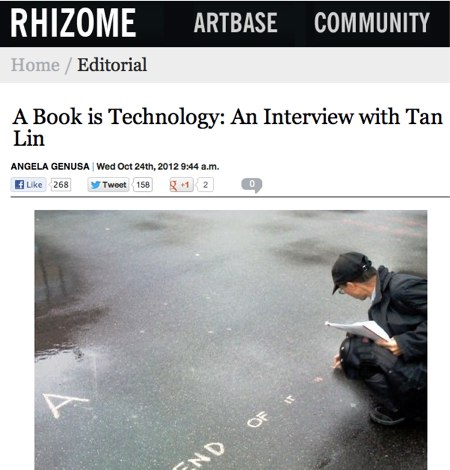Cagean Reading

Tan Lin is a poet, artist, and filmmaker whose work challenges the idea of what constitutes a “book”, and what it means to have “read” something. Many of his works, particularly HEATH (plagiarism/outsource) and Seven Controlled Vocabularies and Obituary 2004. The Joy of Cooking, involve multiple platforms including social media, RSS feeds, email, post-it notes, and programming languages.
In a recent interview, Lin takes a Cagean approach to reading, radically departing from the notion of the book as a codex or even self-contained object.
What led you to use so many different forms of technology in the creation and publication of a book? How would you define a book?
People forget that a book or codex is a technology. My interest with HEATH and 7CV was to treat the book as a distinct medial platform through which a lot of ancillary information passes, much like a broadcast medium like TV or a narrow-cast medium like Twitter or Tumblr. Reading is information control, just as a metadata tag is a bibliographic control. So I wanted to highlight the book’s medial and time-based underpinnings.
It’s interesting to see authors challenging the notion of the book, but by the end of the interview, it became clear that Lin was radically confronting the nature of what reading means. Lin argues that reading is an experience that cannot be extracted from extraneous subconscious perceptions (smell, location, etc.) and indirectly compares it to a Zen mood state.
But a Zen meditative state isn’t reading is it?
My print-based and web-based works both tend to operate with the minimum amount of material necessary needed to constitute what we call reading. I’m interested in the forms of non-reading and boredom, which surrounds all reading and aesthetic experience as its customary default. I mean I like it when works are boring. When I go to see a Cage performance or a Merce Cunningham dance, I am bored half the time. There’s nothing wrong with that. 7CV is about skimming material, appropriating other titles (like The Joy of Cooking) and indexes, and extending the book by enlisting 30+ grad students at The University of Pennsylvania to spin off what publishers would call ancillary titles. Can 7CV be made more interesting by individual readers? Absolutely. This is common in academia, a profession defined by writing books about other books, i.e., generating secondary source material. But there’s no reason secondary source material cannot be more interesting than original source material. Do you have to read 7CV to have read it? Not at all. Moreover, there are many ways to not read a book: you can leaf through it, read reviews or synopses of it, or just lie and say you read it when you didn’t. I was at Columbia where I got a Ph.D. in literature, and there were about 250 books on my orals reading lists—books I had to be able to talk about—but I probably only read a third of them. In fact, though, I had read all of them, just in different ways.
I’m not sure I’m convinced by his definition of reading, but the questions he raises are important, and these are things we need to discuss.
